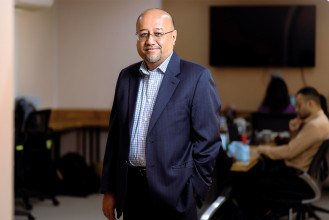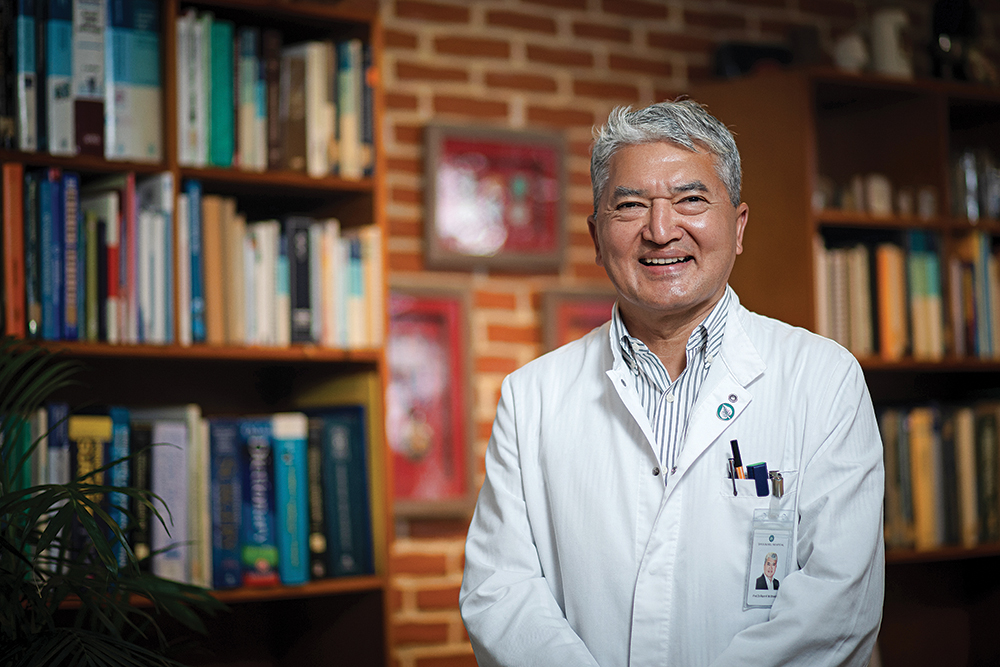
Prof Dr Ram Kantha Makaju Shrestha
Executive Director, Dhulikhel Hospital
Former Vice Chancellor, Kathmandu University
Prof Ram Kantha Makaju Shrestha is the Executive Director of Dhulikhel Hospital and also the former Vice Chancellor of Kathmandu University. A renowned surgeon equally involved in academia, Dr Shrestha felt the need to become a medical professional when he noticed people were dying due to lack of proper health facilities in Dhulikhel. A passionate humanitarian, he always knew that he wanted to work on something that would benefit the larger community. As an accomplished and reputed doctor, he could have chosen to open a private hospital, but instead, he established the Dhulikhel Hospital as a model community hospital that would serve people irrespective of their background, putting lives first. “It is all about humanity. There has to always be a purpose in life and mine is to serve people through the knowledge and skills I have acquired over the years,” he states. Dr Shrestha is also celebrated for his contribution to the development of Kathmandu University which is considered to be one of the finest educational institutions in Nepal during his two terms as Vice Chancellor. He aspires to keep learning, sharing and building a legacy of knowledge that will take the younger generation on the path to progress and nation building. In this issue of Business 360, we spoke to Dr Shrestha on various issues surrounding health and education in the country with personal insight into what propels his work. Excerpts: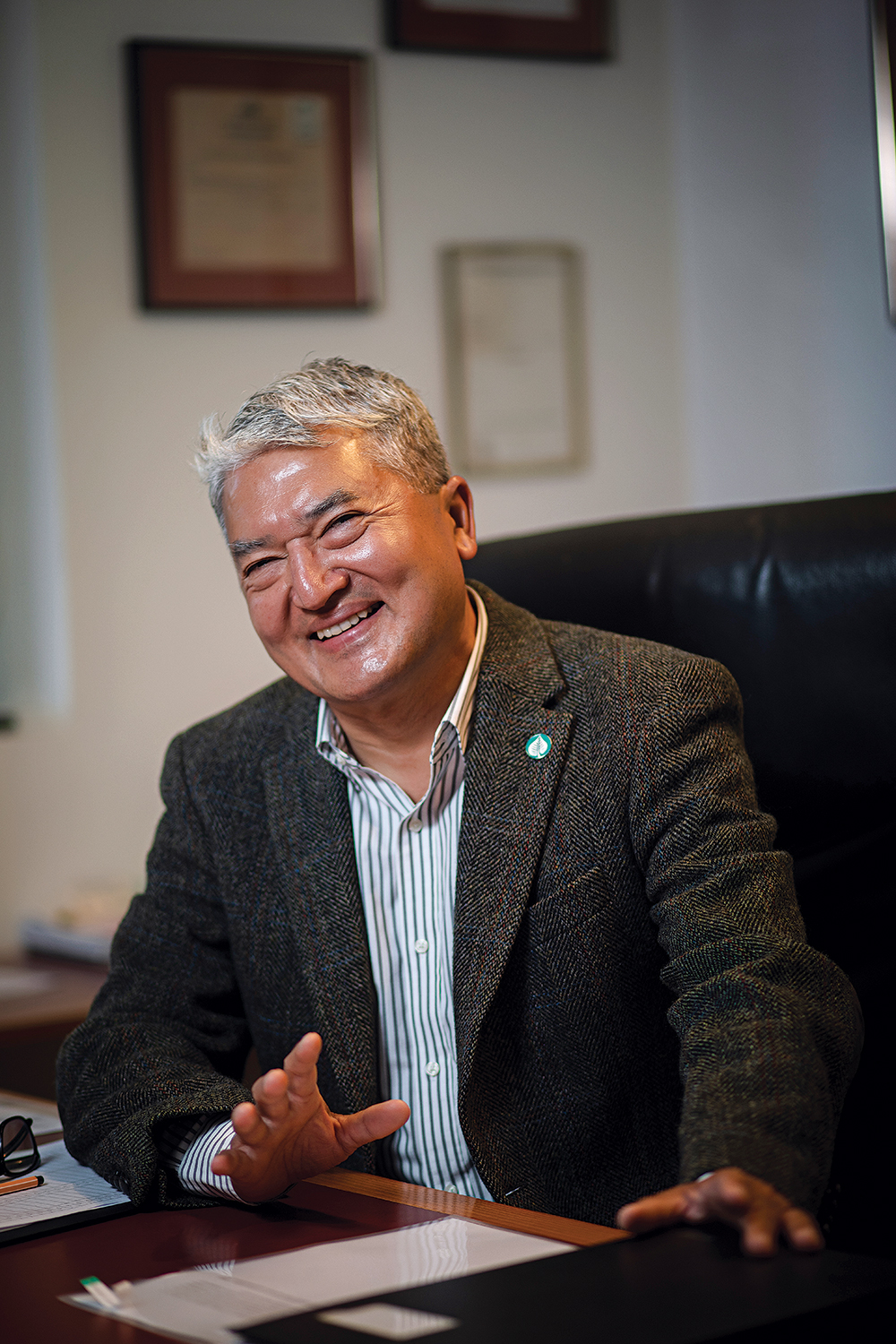
Where did the concept of establishing Dhulikhel Hospital come from?
Any person or specialist who has established a health institution must first and foremost be looking at how they can save a person’s life. How can they resolve the person’s difficulties, how can they alleviate their pain and suffering. These are questions that should come first to your mind. This is something I have always believed in – first deal with saving the person. The other things like paying the hospital fees or any other stuff can be taken care of gradually. Whenever we do good to a person then that person will definitely do good to you leaving aside a few exceptional cases. That is a very natural human phenomenon. At times it is quite confusing on whether a person is providing service to run their business or whether they are in the business to provide service. Which comes first? It depends on what a person has prioritised in life. There are times when a person gives something so that they get something in return and that something can differ. It could be the person wants the other to understand them better, or some do it for religious purposes, and there are times people do it to earn money. These reasons are always there. Around 25 years ago nobody in Nepal had thought that a hospital could and would be built for the community from within the community itself. Back then people used to solely rely on the government and blame the state if something was not done. The general mindset was that the government had to provide all the facilities, be it schools or hospitals. But I don’t think there is anything that the government can do which the community cannot. As citizens, we have to understand that any village or city is fundamentally a collection of individuals and the nation is a larger collection of these villages and cities. So, if you look at it conscientiously you will realise it all starts from the individual. This is something everybody needs to comprehend. We thus started with just four rooms in the beginning and today we are a full-fledged hospital. And like I mentioned earlier, we built ‘from within the community’. The land for the hospital was provided by individuals.Having completed your studies in Austria and also having already started a career there, what made you return to Nepal?
As humans, we always like to be in a place where you are valued more and what greater pleasure than having the opportunity to transfer the knowledge and skills you have to other individuals. To be honest it was due to those selfish reasons that I returned. I wanted to be a person of value to the people and place I am in. Also, it was a question on whether I stay back and enjoy doing things within an organisation that was established by somebody else or do I start something on my own and create my own opportunities? I chose the latter because I had the belief that I could start something substantial here and create opportunities and do much more for a lot more people. We, as a team, serve thousands of people in Dhulikhel Hospital and they come to us because they trust the service we have been providing. I am very proud that people believe in the care we are providing because at the end of the day any relation whether it is personal or professional relies on trust. As humans we should never break the trust that someone has placed in us, else we lose our humanity. Whenever you lack anything material you can always get one or if it is broken you can get it repaired but once you lose the trust of others then you lose everything. Through the hospital, I have been fulfilling my reasons for coming back. As the Executive Director of the hospital, it is not necessary for me to have the details of all the employees. What I need to do as a leader is to help them build the skills they possess. I don’t think there is anybody who does not have any skill at all. The only aspect is the skills will differ from one another and some may have minimal skills. It is up to those leading the organisation to harness and develop those skills. So that is another reason why I started the hospital – to demonstrate that people here also have the necessary skills and that we are capable of providing the best services.How do you view the medical sector of the country?
In the last 30 years, I think the education sector is probably the one which has developed the most and even within that, it is medical studies that have developed hugely in Nepal. In the last two decades, we have been able to develop all the medical facilities that are available elsewhere. And since medical studies have improved vastly even the services that we can provide are at par if not better than the services you would get in developed nations. A lot of facilities and services are available in Nepal itself and what is even more wonderful is that it is us Nepalis who have learnt to improve on them. In the previous days, people had to go abroad for treatment of even diseases like hernia but now be it any problem related to the brain or the spine, you name it, and we have the facilities to treat here itself. For instance, even in Dhulikhel Hospital, we have technologies whereby a patient who previously had to undergo surgery lasting six to seven hours can now be treated within an hour. Medical facilities and services have been improving a lot in Nepal. What I believe is when you showcase good aspects of anything then there will be others who will try to make it better but if we keep focusing on the negativities then we will be living a life in darkness. Why not step outside and look at the bright sun?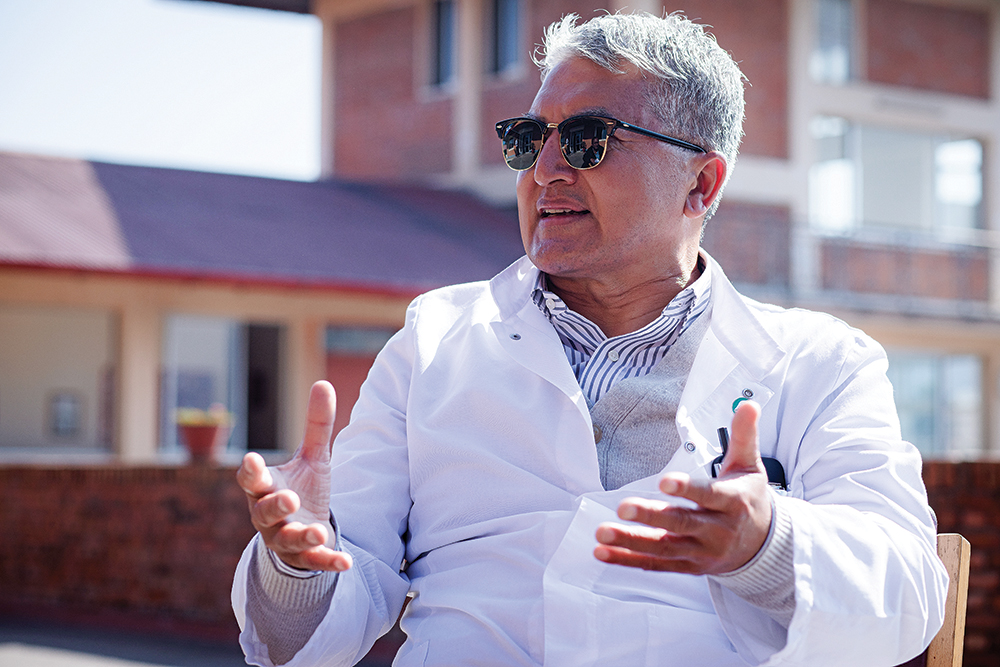
What is your opinion about access to health and health equity in the country?
Everybody should have access to health services. The time it takes to access a health facility is another chapter. A disease does not differentiate between a rich and a poor person’s body. A body is a body and a disease is a disease. All citizens need to have access to health whether they are living in a city or in a remote area. This is something the policymakers must look into. We send people to the government to develop policies that are beneficial for the nation but they choose to dwell on other things. Not only access, policymakers also must make sure that health services are affordable for all. The other important aspect we need to focus on is health insurance. Nobody gets sick because they want to or nobody knows when they will get sick but what we can do is stay prepared so that we are ready in case we fall sick. It is good that the government has taken the initiative to start health insurance but again people are sceptical whether it will work. My opinion is any new initiative will take time to germinate and mature, so let’s be positive about it. Even developed countries took decades to have a proper health insurance policy and still face glitches at times and here we are complaining and bickering about something that has just been started a couple of years ago. We will make mistakes along the way and learn from those experiences. Impatience is one trait we Nepalis seem to have in abundance. We all have desires to achieve certain goals but we need to work relentlessly with conviction and may be in the next 10 years we will be able to achieve our goal. It is about matching your wish with the conviction that you can fulfil it. So, I would say things are improving on that front and we just have to give a little more time for things to fall in place."I always derive immense satisfaction when I am able to pass on what I know to the youths. If you teach others, then those skills and knowledge will stay forever or else it dies with you. And when everybody starts doing this, the country as a whole will develop."
There are many expensive hospitals being set up across the country and there is an increase in alternative medicine, how do you view these trends?
It all depends on a person’s habit. If I ask you right now about your best chef, you will probably name your mother but our mothers never took any cooking courses. So, knowledge and skills are intertwined with love. To take care of somebody is about touching that person, feeling that person. The problem is that people living in the urban centres have a mindset that whichever place is a bit expensive then that place is better. Prior to that, the belief was that whichever place has a bigger crowd then that place is better. This trend is common even for places that sell momos. So, it is not about how much you pay but about the care that you receive. That’s what you should be looking for. Alternative medicine and healing methods I feel do complement the services we provide. Medicine is such a subject that things keep changing every two years. You don’t have to wait for 10 years for things to change. No matter how much we have studied and know, after about every two years there are new developments and we also don’t know about many things. Just because I don’t have much knowledge about a particular subject, I can’t say it is not good. I am a surgeon and know everything about it but I don’t have much knowledge about alternative medicine. There are many things related to alternative medicine that I don’t have knowledge about but can be useful.You have been the Vice Chancellor of Kathmandu University. What improvements do you feel are needed in the education sector?
In a way I was impelled to be the Vice Chancellor of Kathmandu University. I was being consistently asked by many people to do something in the education sector for the larger good of the country. People who were involved in establishing the university and other academia were all saying that the sector needs to be further developed. That is one reason why I decided to devote my time to the university. However, I must mention that the education sector in Nepal has grown by leaps and bounds. When I joined Kathmandu University, I didn’t have to look for any new employee because all those who were there were very capable people. What this demonstrates is that there are talented people in Nepal too and I was very happy about it. Though the university was not very big at the time we offered many courses and we focused a lot on research. Today, KU is one of the best educational institutes of the country. Initially, when I joined KU, it was set on around 400 ropanis of land but when I left, we had expanded to around 2,500 ropanis of land. We focused a lot on developing the infrastructure and today it is world class. We continued with even those programmes that were being run on deficit and we were able to reap the benefits of our persistence. The curriculum we have developed is top notch. If we had a few more universities like KU, then just imagine how not only our education sector but the whole country would develop. Universities are being established but what is the point in setting them up when students still have to go abroad for higher studies. Likewise, what is the point in having many hospitals when patients have to travel abroad for treatment. So, it is not only about setting up something but about providing the quality that is required.Is there any way we could reverse the practice of students going abroad for further studies?
We should not be stopping or preventing people from going abroad for work or studies. It is like stopping the development of those individuals. You should never stop the process of people wanting to develop themselves. If you try to do that then you are on the path to self-destruction. You should never have rules and laws that punish or prevent a person who is trying to do something in life whether it be business or education. Instead of stopping them from going abroad why not start the things in Nepal itself for which they have to go out of the country. For example, previously in Dhulikhel people used to go to Kathmandu even for minor ailments but since the hospital was started, they come here even for big health problems. So, instead of stopping or preventing people from going outside we should focus on providing what they need in the country itself. We have patients from so many districts like Ramechhap and Sindhupalchowk coming to our hospital. It is very rare for people from our vicinity to go to Kathmandu for treatment, which means if we do provide the facilities then people will not go out of the country. And I can’t comprehend the idea of stopping students from going abroad because the country’s foreign exchange reserves are depleting. That is stupidity. You have to look at other ways in dealing with that situation and not stop students who want to develop themselves. Will the money that is saved by preventing students from going abroad help the development of the country? No. The government should look at infrastructure development and other projects that will kickstart the economy.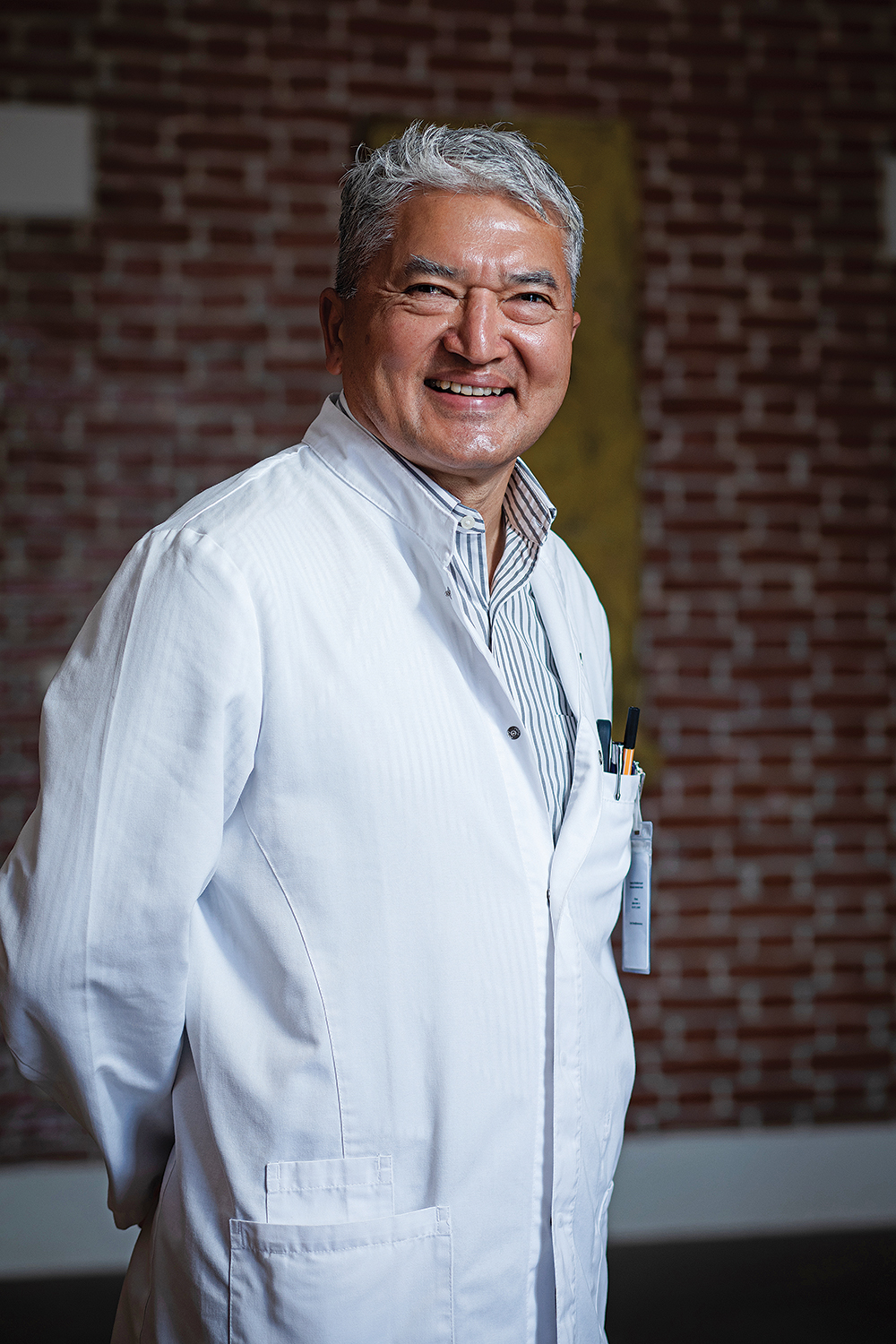
Were there any major difficulties when starting the hospital?
There always has to be a belief in yourself that you can do something. You must have the conviction that you can achieve the goal that you set out to do. And I had that belief in me. I also had the conviction that I will do something that is beneficial for others. You need to have the thought that I will always give what is within my best capability. The only factor you have to be aware of is how big are you going to make that thought, what shape are you going to give it. And what I realised is when you have the conviction and a pure feeling of helping others then there will be people who will reach out to you. And today Dhulikhel and the hospital have become synonymous.Between medical practice and academia, what is your preference?
It would be like if I want to keep the soil or the water. Both need each other. What I always say is what I am today is because someone else taught me those things. The knowledge that I have gained is from somebody who previously had it. If you want to give continuity to all the knowledge and skills that you have acquired, then I think it is through education that you can do so, by imparting what you have learnt to others who want to acquire it. I always derive immense satisfaction when I am able to pass on what I know to the youths. If you teach others, then those skills and knowledge will stay forever or else it dies with you. And when everybody starts doing this, the country as a whole will develop. I have always followed the principle of helping people. That is one principle we follow at Dhulikhel Hospital – provide the best service at an affordable cost. So, I would prefer to call myself a doctor as well as a medical teacher.How do you think we can best prepare for uncertainties of new diseases like the Covid 19 and monkeypox?
The capability of any person or organisation can be best gauged when they can create an opportunity from any adversity that comes their way. What would you like to call yourself – a person who defeated Covid or someone that the Covid defeated? So, what I would say is one has to have the willingness to fight against any crisis. Even if the opponent is stronger you have to have the fight in you. We are not a developed country but we got the vaccines from other countries and there were situations when a person had to take three different types of vaccines. I think if you look at that period then Nepal was one of the few countries that was able to come out of the pandemic faster. One of the first persons to die of Covid in Nepal was here. We knew that people could die of Covid and we could have sent that patient to Kathmandu and nobody would question us. But we didn’t do that. It would be against the principles of humanity. As a hospital it is our responsibility to never turn away a patient if we can provide the needed service and we did our best. Nobody knew whether they would survive or not if they contracted the virus and we have young people working here but we did not shirk from our duty. In such situations we should not be complaining or blaming one another. We should all get together and fight against the situation to the best of our individual capacity. We should put in our soul whenever such situations arise and face them. We could have taken the easy way out by closing the hospital. We wouldn’t have had sleepless nights and spent so much of money but that is not how you deal with adversities. So, I would say to deal with such situations people must collaborate and face adversity headlong.How do you lead big teams as you do at Dhulikhel and did with KU?
I would like to quote Napoleon on this. A leader is one who knows the way, goes the way, and shows the way. I am not afraid of an army of lions led by a sheep; I am afraid of an army of sheep led by a lion. A leader is best when people barely know he exists, when his work is done, his aim fulfilled, they will say: we did it ourselves. So, as a leader you have to be a bit different from others and walk the talk which is the only way you can gain the trust of your team. READ ALSO:
Published Date: December 2, 2022, 12:00 am
Post Comments
E-Magazine
RELATED In the Lead


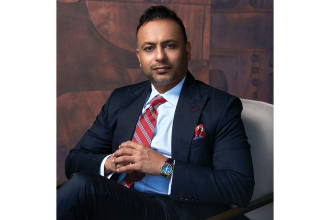
-1767340083.jpg)
